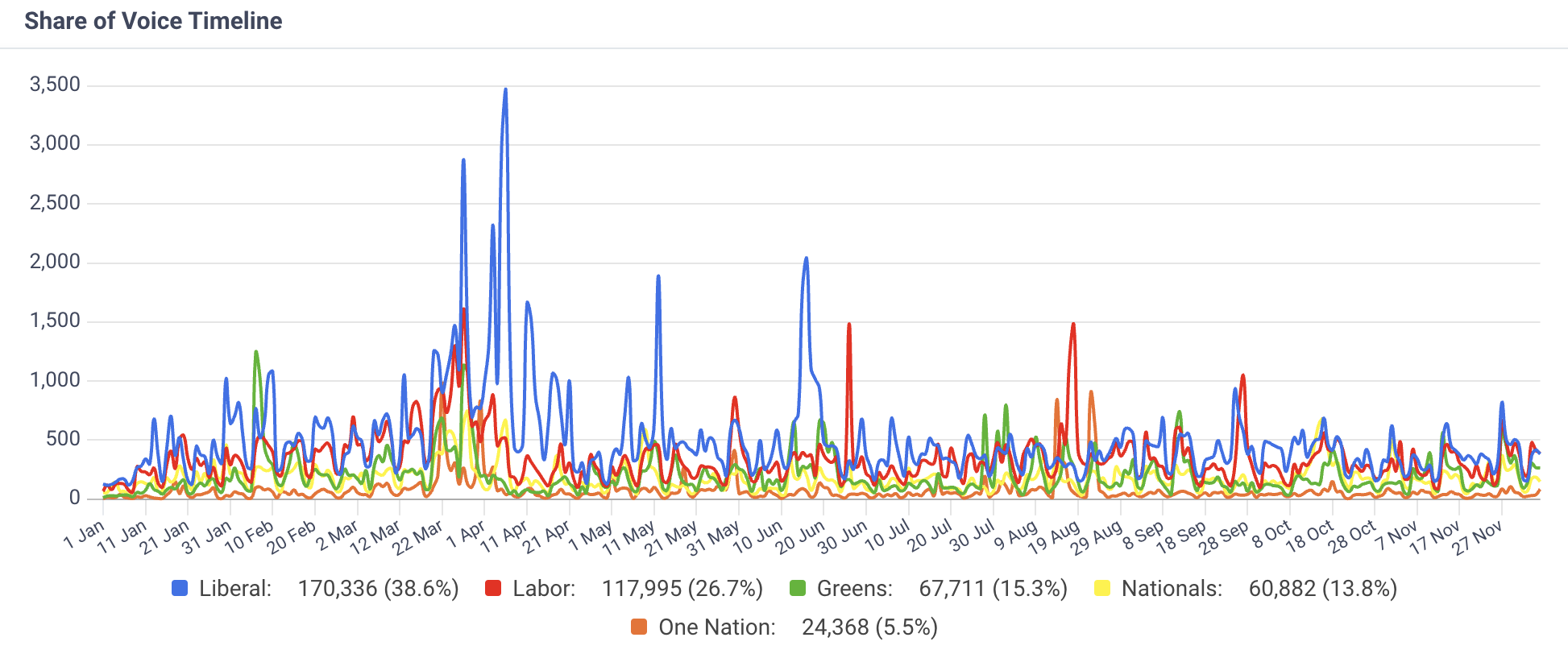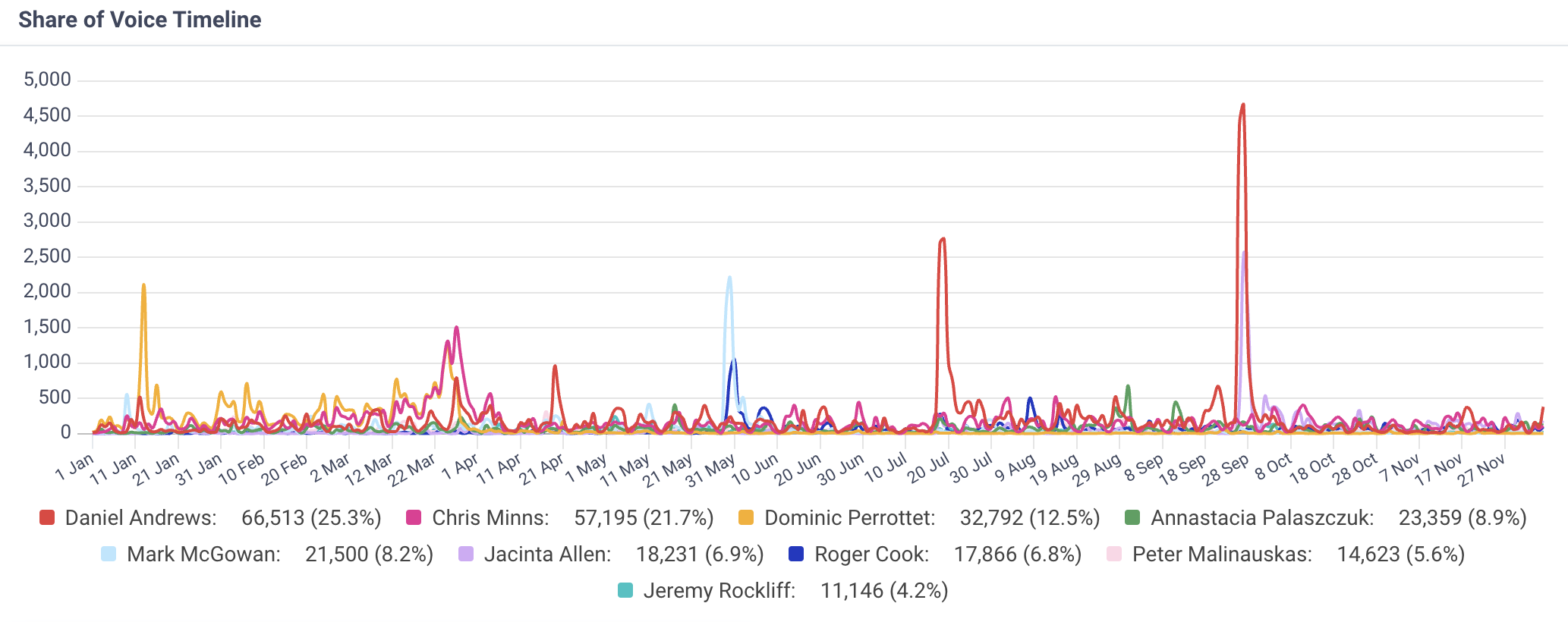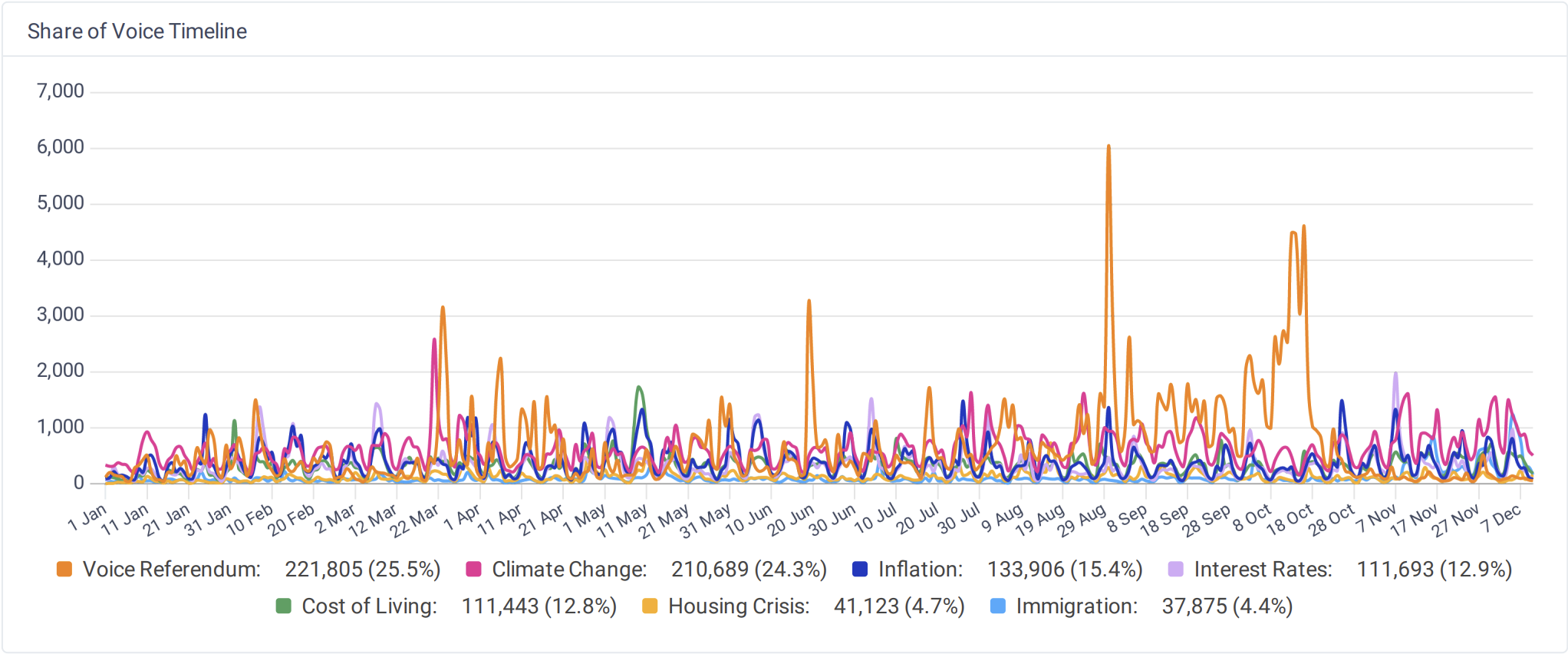As we bid adieu to 2023, it’s time to reflect on the media coverage of Australian politics that has unfolded over the past year. In our annual review, we’ll look at what gained the most media attention in Australian politics in 2023 as we unwrap the key narratives, dissect the major players, and unravel the tapestry of domestic political issues that dominated headlines.
Which political party dominated the headlines? Whose voice resonated the loudest in the media? What issues captured the public’s imagination? Our comprehensive analysis provides an overview of the political news that defined the year, delving into the ebbs and flows of media attention on political parties, prominent politicians, and crucial domestic issues.
Parties in Focus

Despite not currently being in power, the Liberal party received the largest share of voice, 38.6% of media mentions compared to the other major parties.
The noteworthy surge on March 25th can be attributed to the New South Wales Liberal National Party’s defeat in the state election, ushering in the first Labor government in the region since 2011. This event propelled the Labor Party to its peak coverage for the year. Liberal media attention escalated when former Victorian Liberal, Moria Deemings, delivered a speech at a controversial anti-trans rally in March, leading to her subsequent expulsion from the party room, amplifying Liberal Party mentions during this period.
In early April, coverage experienced another notable and sustained upswing following Peter Dutton’s announcement that the Liberal Party would oppose the proposed Voice to Parliament for Indigenous Australians. This decision prompted resignations from prominent Liberal figures, including Ken Wyatt and Julian Leeser, each resignation triggering spikes in media mentions.
Late June witnessed a surge in Liberal party mentions due to allegations of sexual harassment against Victorian Senator David Van, culminating in his expulsion from the Liberal Party.
The sudden passing of former Labor Leader and ACTU president Simon Crean on June 26th resulted in a spike in media coverage for the Labor Party, marking a poignant moment in the political discourse.
The late August spike can be attributed to the AUKUS nuclear submarine deal, as debates surrounding the agreement reached a peak in media coverage, affecting both public discourse and the visibility of the Liberal Party in particular.
State Premiers in the Spotlight

Daniel Andrews continued to be a media magnet, commanding a substantial 25.2% share of voice when compared to his counterparts among state premiers. His presence in the headlines experienced significant fluctuations throughout the year, with two standout moments resulting in his peak media coverage volumes throughout the year.
The cancellation of the 2026 Commonwealth Games, initially slated for Victoria, triggered his second-largest spike in media mentions. However, it was his unexpected resignation in late September that catapulted him to the pinnacle of media attention, marking the most substantial surge in coverage for the year. The swearing-in of Jacinta Allen, signalling a pivotal shift in Victorian politics after nine years under Andrews.
In the realm of New South Wales politics, Chris Minns carved out a remarkable narrative. His victory and subsequent elevation to the position of Premier led to an astounding 433% spike in media mentions, securing him the second-highest share of voice among the state leaders. While he maintained a relatively steady media presence throughout the remainder of the year, no other notable spikes in coverage were observed.
2023 witnessed a notable degree of turnover among state premiers, with four states experiencing the leadership baton passing through two hands in a single year. The resignations of Mark McGowan, Daniel Andrews, and Annastacia Palaszczuk, coupled with Dominic Perrottet’s electoral defeat, orchestrated this transformative shift in state leadership.
Domestic Issues

The Voice Referendum emerged as the undisputed focal point in the media landscape throughout 2023, commanding an impressive 25% share of voice when juxtaposed with other prominent domestic issues. The dynamic discourse surrounding the Voice, spanning arguments both for and against, captivating campaign narratives, and comprehensive coverage of the news pertaining to the initiative, persisted as a constant presence in headlines and discussions throughout the year.
Securing a solid second place in media attention was the critical subject of climate change, which unfolded through the lens of varying weather phenomena such as El Niño and La Niña, as well as the dramatic narratives of floods and heatwaves. In late March, ‘Climate Change’ coverage saw a spike after The Intergovernmental Panel on Climate Change (IPCC), comprising foremost climate scientists globally, has issued a dire “final warning” regarding the climate crisis. This extensive assessment of humanity’s understanding of the climate crisis required the collaborative efforts of hundreds of scientists over an eight-year period, resulting in a report spanning thousands of pages.
Surprisingly, interest rates took precedence in media coverage over other pressing concerns for Australians, surpassing both the cost of living and the housing crisis. In 2020, ABS data underscored the widespread impact of interest rates, revealing that a significant 66% of Australian households owned their homes, with or without a mortgage, while 31% of households were engaged in renting.
This data highlights the pervasive influence of interest rates on a larger proportion of the population compared to the housing crisis, demonstrating their role in shaping the economic stability for a majority of households. The conversations around economic indicators and financial policies captured the attention of audiences, reflecting a heightened awareness of the Australian economic landscape and its implications for individuals and households. It is noteworthy that these factors collectively contribute to inflation, which secured the third position overall in media mentions with a 15.4% share of voice.
Conclusion
In 2023, we saw four states take on new premiers, only one through an election win. With domestic economic issues at the forefront of Australian minds, the newly appointed leaders faced the immediate challenge of navigating economic uncertainties and addressing the concerns of their constituents. The dynamic landscape of state governance, coupled with the ongoing dialogue on economic policies, set the stage for a year of strategic decision-making and collaborative efforts aimed at fostering stability and growth in the face of evolving challenges. Additionally, the looming 2024 ACT general election adds another layer of significance, as political dynamics and policy priorities will likely come into sharper focus in the lead-up to the election.
